Nestled deep in Buperta Park in Cibubur, a neighborhood in East Jakarta, there’s a sporting field with wonky goalposts casting short, crooked shadows under the hot, midday sun. Upon the trampled grass of the field, a group of around 35 men are chasing after a strange, oval-shaped football that would be unfamiliar to most Indonesians.
A team of big bodied ‘bules’ (foreigners) are matched up against a group of wiry locals, who are small but cover the ground like lightning.
Although many Indonesians are huge fans of football, most would probably be confused by the game being played in the park that day. But on the sidelines of the scrimmage, a group of Indonesian kids are cheering “GA-RU-DAS, GA-RU-DAS” at the top of their lungs while clutching strange, oval-shaped balls of their own.
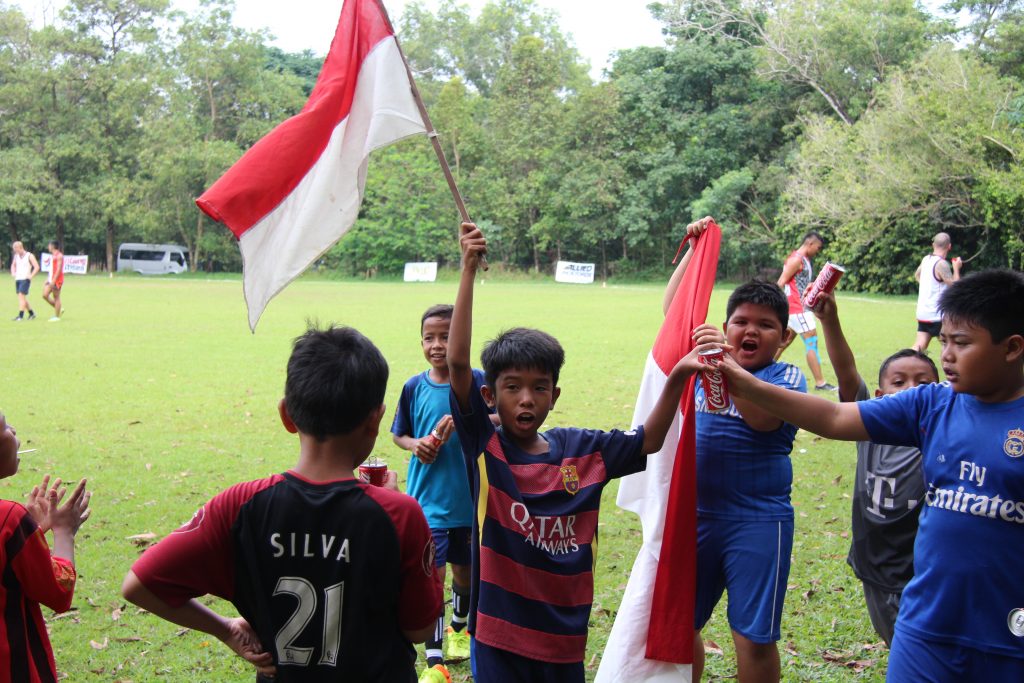
The men on the field are actually playing Australian Rules Football (aka Aussie Rules), a sport played almost exclusively in Australia, but which has a small yet dedicated Indonesian following.
The Indonesian players are on a team called the Indonesia Garudas, made up entirely of locals, and they are playing against the Jakarta Bintangs, made up mainly of expat Australians.
For those unaware, Australian Rules Football, or ‘footy’ as Australians usually call it, involves a mix of kicking and handballing across the field with the aim of scoring between the goalposts at either end. Kicking the ball between the two centre goalposts is worth six points, while kicking it between the outer goalposts is worth one point. The game is also commonly called AFL football, as the AFL (Australian Football League) is the sport’s most popular and only fully professional competition.
The game is ferocious, with tackling a main feature and, on this day, the bigger bodies of the Bintangs are making it difficult for the Garudas to get the ball forward. They burrow under packs intensely to extract the ball, but are lacking the polish to finish off with a goal. At half time, the Garudas are down 52 to 36 and, during his address to the players, their coach Barry Anderson laments that they are not getting to the ball first, despite their advantage in speed.
“Chase out of the forward line!” Anderson screams. “When they have the ball, you find your man and man up!”
The Garudas players listen closely to their coach’s plea, while still short of breath and perspiring furiously from the intensity of the contest they’re immersed in.
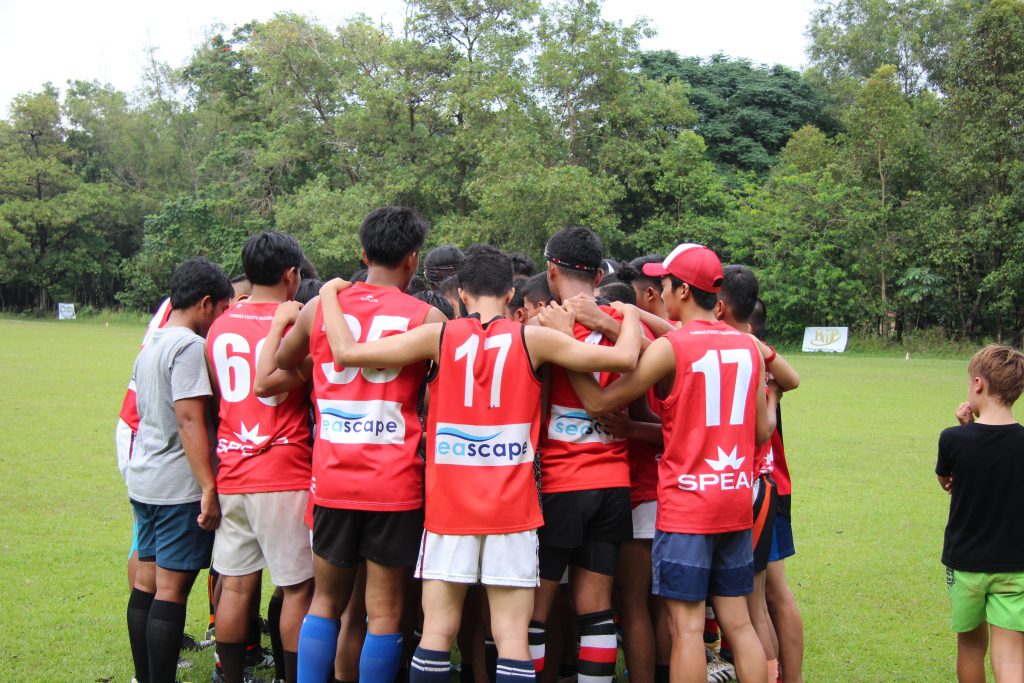
Despite Anderson’s advice, the Garudas continue to fall away to the more experienced Bintangs, eventually going down 107 to 57.
But their loss does little to dampen their spirits. The Garudas are grateful for any chance to sharpen their skills against foreign players in the hopes they can use that hard-earned knowledge against challengers from around the world at the International Cup in Melbourne this August.
The kids who cheered the Garudas on during the game swarm the field after the match, many with a footy under their arms, keen to play the game themselves. They already know how to kick, handball and mark, and they love to tackle with every opportunity they get.
Importing AFL football to Indonesia
So how did an obscure game like Australian Rules Football make it to the shores of Indonesia? A lot of the credit must go to the Jakarta Bintangs, who formed in 1995.
President Paul Halliday, explained that the club originated more out of boredom than any desire to develop the game in Indonesia.
“We were a group of expat Aussie guys who had nothing better to do and over a beer one day, we all said ‘why don’t we get involved and play football?’” he said.
“I’m a founding member going back to 1995, so we all got together and started training on a Thursday night. It was more to socialise and have a drink than anything else but before you knew it, we had Singapore come down here 21 years ago to play the first game against the Bintangs,” he said.
As more matches took place over the years, Indonesian locals would come and take in the strange spectacle, eventually asking if they could play as well. So, around 2006, the Bintangs started getting Indonesians actively involved in the sport.
And that’s how the Indonesia Garudas, an Aussie Rules team made up entirely of Indonesian locals from across the region, was first formed.

Developing a team from the ground up, with young men who had no prior experience playing the sport, was a challenge to say the least.
“At the start, none of them knew how to kick, none of them knew how to handball,” Halliday said.
By working closely with the Bintangs, the Garudas’ skills slowly developed to the point they were invited to compete in the 2014 AFL International Cup (IC14) in Melbourne, in which representative teams from countries across the globe compete against each other to crown the best Aussie Rules football nation in the world (besides Australia).
The Garudas came 16th in that tournament, but came away with the invaluable experience of playing the game on the international stage.
“We took them to Melbourne in 2014 and they performed as best they could. They won one game against India, out of the four they played, which is quite an achievement,” Halliday said.
The Garudas took heed from the lessons of IC14 and continued to develop their skills. This improvement was evident when they competed in the inaugural AFL All-Asian Cup in Vietnam last year.
The tournament featured National Aussie Rules players from across Asia, competing in a three-way tournament between the Garudas, Team Indochina and the China Reds. The Garudas won the tournament, defeating both Indochina and the China Reds, to show they were a force in the burgeoning Asian Aussie Rules football scene.
https://www.youtube.com/watch?v=8O15BOKNYUI
Now the Garudas have their eyes set on competing at the next International Cup (IC17), which is being held in Melbourne this August. But whether they’ll actually get to go is still up in the air.
Struggles of playing in Indonesia
If they don’t get to go to IC17, it certainly won’t be due to a lack of dedication. Simply playing AFL football in Indonesia is already a massive challenge. They don’t have a proper field to play on, money to buy balls, boots or other equipment and they receive very little support from the AFL to stay afloat.
Everyone involved at the Bintangs and the Garudas are volunteers, yet they put in countless hours developing the team and the game in Indonesia. The players themselves come from across the archipelago, from places like Bogor, Bali and Kalimantan to name a few.
Many spend two to three hours fighting Jakarta’s hellacious traffic just to get to practice. But they still come with a smile on their face and boundless energy, keen to make the most of any chance to play the game they love.
The team were only able to play in the All-Asian Cup last year after they managed to raise enough money through an any-means-necessary fundraising campaign; acquiring sponsors, selling merchandise and organising raffles.
And now they need to do the same thing again. They’ve launched a fundraising campaign to raise $10,000 to pay for flights, accommodation, visas, clothes and the equipment they’ll need to compete in IC17. Relying on sponsors and donations to survive is not ideal, but Halliday remains optimistic the campaign will be a success.
“We’re reasonably confident we’ll be able to find enough money [for IC17]. We’re going to have an event at the Australian Embassy in March and we’ll invite a lot of business people along and hopefully they’ll dig in their pockets and help fund us,” he said.
AFL handballs responsibility to volunteers
The AFL is Australia’s wealthiest sporting body, recently signing a new six-year, $2.5 billion broadcast rights agreement and posting a $19 million profit off the 2016 AFL Grand Final alone.
Yet, despite the AFL’s vast resources and their stated commitment to grow the game worldwide, they provide very minimal support for the game’s development in Asia.
Andrew Hughes, the AFL’s Community Football Operations Manager, told Coconuts Media that Aussie Rules football in the region is mainly organised through the volunteer group AFL Asia, with the AFL providing minimal funding.
“We have regular catch-ups with AFL Asia and support them where we can, whether that be by sending staff to run coaching education or assisting with umpiring development activities, usually around the Asian Championships they organise each year,” Hughes said.
“The structure of footy in Asia differs from country to country. You have some countries where it’s largely just expats playing against other countries… and then you have some [like Indonesia] where there’s a lot of locals playing.”
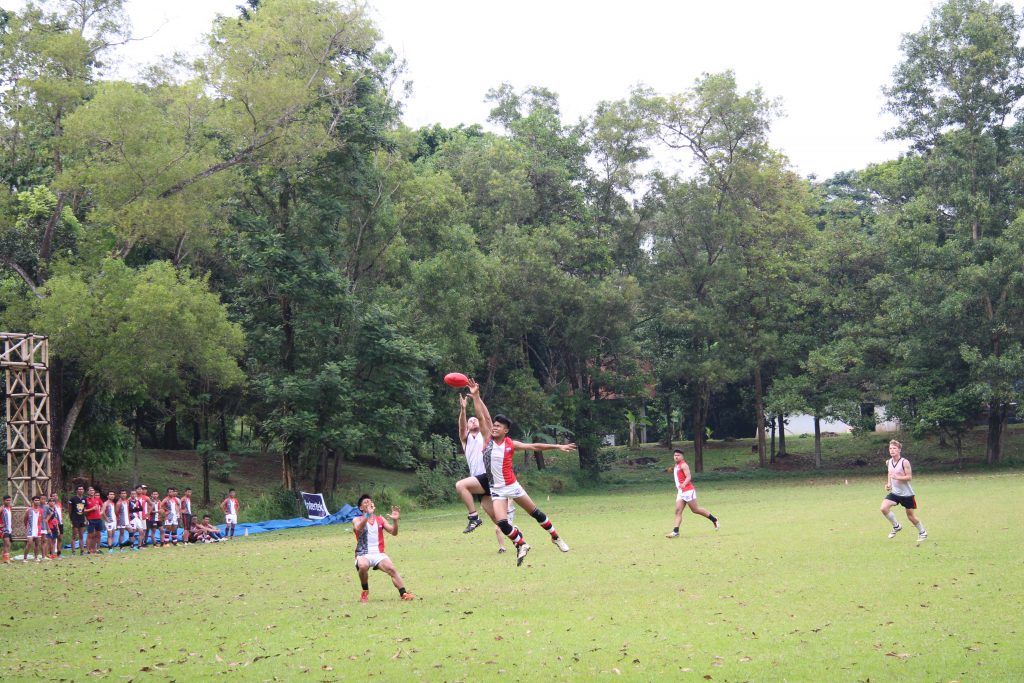
“So our focus is trying to get as many locals as possible to play but we certainly understand we rely on volunteers, largely expat Australians, to appear in those countries and help us promote the game.”
When pressed on whether the success of the grassroots development shown in Indonesia would lead to increased funding from the AFL, Hughes was non-committal.
“There’s certainly scope for it. Everywhere could do with more money. The challenge is trying to align with key partners, whether that be the AFL clubs who have an interest in a particular region or through governments to try and promote opportunities,” he said.
“So in the future, there may be, but there’s certainly no guarantees.”
Development program
The Jakarta Bintangs are developing AFL football in Indonesia beyond simply the Garudas, but also through a development program in schools and orphanages across the country.
The development program is currently implemented in 25 schools and the Indonesian Ministry of Education and Culture has just asked the club to implement it in another 30 schools. The program was set up by the Jakarta Bintangs with the help of Boy Pasaribu, an Indonesian local who joined the club 10 years ago.
It is now run by Pasaribu and fellow Indonesia Garudas coach, Barry Anderson. They travel to schools and orphanages every week running coaching clinics and promoting the game.
“We leave footballs and cones at the schools so their sports teachers can then follow up and teach the kids the sport. Just before Christmas we held a school competition where we got 10 to 12 schools to come in and play against each other,” Anderson said.
“It’s really about introducing the game of Aussie Rules at grassroots level to the primary school kids. And the kids love it, it’s not always about football, it’s about fitness and health and keeping them outdoors and active. They love being around ‘bules’ as well and they get excited about that.”

The club’s orphanage visits have been an effective recruitment method for the Garudas, helping them to find 13 of their most dedicated players. Antoni Yakobus and Frenky Warruwu are two examples of this, having been recruited to the Garudas from the Mama Sayang (Dear Mama) orphanage in Bogor.
“I started playing footy four years ago, in 2013. I started playing when Boy Pasaribu came to our orphanage, Mama Sayang, where I had been living for the last three years. Boy came there and showed us how to play,” Antoni said.
“I hope that footy can flourish throughout Indonesia. Through footy I’ve been able to meet so many different people, made a lot of friends and had a lot of great experiences.”
Antoni has also joined the club’s development program. He’s now employed by the football club and goes out to schools, teaching young students how to play the game.
Frenky has been playing footy for six years, coming to Jakarta for training every week while living in Bogor and balancing his commitment to the team with study and work. He was lucky enough to play in Australia for IC14 and hopes to return for IC17 in August.
“[When] we played in Melbourne, I learned a lot from that experience. Boy always supports and motivates us. He is always helping us understand new ways that we can become better players,” Frenky said.
The Aussie coach
The Garudas are only able to operate through the help of dedicated volunteers, who sacrifice their time and resources to develop the game in Indonesia.
Their passion and commitment is exemplified by the Garudas’ coach, Barry Anderson.
A keen Aussie Rules enthusiast all his life, Barry was living in Brisbane, Australia, as a local football club president when he heard a volunteer was needed to coach the Garudas and help with the game’s development in Indonesia.
So he quit his job as a state manager of a company in Australia and transplanted his family to Indonesia in August last year. The role is for 12 months, but he says he is already looking to extend his stay so that he can shape the Garudas into a more successful team on the field.
“My wife and I have a passion for developing countries, where you can help the less fortunate, and we looked at what knowledge we could pass on. With my football skills from the past, we thought it would be a good fit,” he said.
“You have to do something you’re passionate about, something you love. I love Aussie Rules, I love travel and I love volunteering. And this position filled those three criteria.”
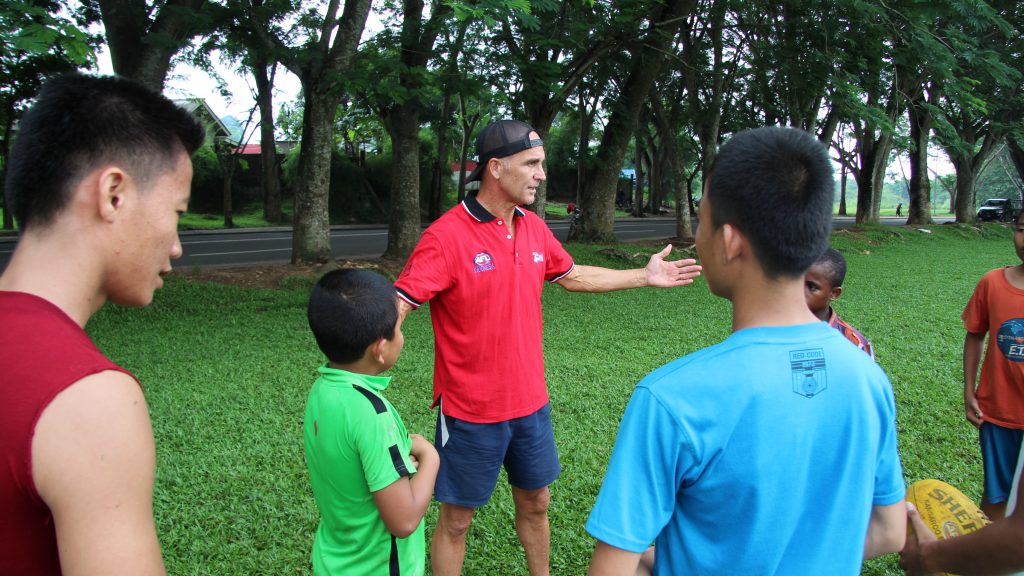
Barry knows the Garudas’ strengths are their speed and agility, but despite being quick learners, he said it’s hard to instill in them the finer points of the game when they have limited opportunities to play proper matches.
“They know the skills of how to kick, handball or mark, but they don’t know the intricacies of how to play their position and how to move the ball from the backline to the forward line. So there’s a lot of that which they need to learn and that’s what we’re trying to teach them.”
As for IC17, Barry just hopes the Garudas can be competitive while improving their own skills and knowledge of the game.
“To be honest with you, it’s not always about winning games. Of course, we go out to win every game, but the real expectations are to make sure they’ve advanced from where they were at the start of the year [while being] competitive against other countries around the world.”
The future of AFL in Indonesia
I got a small taste of just how tough developing AFL football in Indonesia is, when I accompanied Barry, Boy and Antoni to one of their coaching clinics. We drove from Jakarta to Bogor, a two-hour journey thanks to Indonesia’s terrifying traffic.
When we arrived, we were greeted by a muddy, waterlogged soccer field by the side of the road. Shallow water covering the centre of the field made it unusable and, thus, a proper match impossible.
We were expecting a group of kids from Mama Sayang orphanage just down the road, the same orphanage that many of the Garudas had been recruited from over the years.
The children were late, however, so the coaches and I stood waiting by the ground, (which the club had to pay $100 just to use) in the hopes they would show up eventually.
While we waited, another group of Indonesian kids started playing soccer on the pitch, decked out in their favourite team jerseys.
Barry went up to them and showed them an AFL ball. They seemed confused at first, head-butting the ball when he threw it at them, but he soon had them kicking it in true Aussie Rules style.
When the kids from the orphanage finally arrived, they were itching to get their hands and feet on the footy. Barry got them learning the basic skills straight away and they had little difficulty adapting to the game’s unique characteristics.
It was obvious from their infectious enthusiasm that these children loved having the opportunity to learn something new and different.
Meanwhile, Antoni and Boy put some of the older boys through their paces, subjecting them to a vigorous boxing exercise. Boy told me it was to gauge the player’s fitness levels, as the Garudas would only be taking those who were fit to Melbourne for IC17.
As this was going on, the kids that had been playing soccer on the pitch earlier were watching from a distance, perplexed but interested. It is this innate curiosity that Indonesian children seem to have for AFL football that has led to its growth within the region, despite the lack of funding, resources and equipment available.
Due to the late start, I had to leave the clinic about an hour after it started. Despite the heat and humidity, the kids were still running and kicking, still with beaming smiles on their faces, showing no signs of exhaustion. They may not have had Garudas jumpers on just yet, but it was clear that I was looking at the future of Indonesian AFL football.
The club just got approval to bring their coaching clinics to high schools across the country, which will hopefully give even more kids the opportunity to find out what that game with the odd oval-shaped ball is all about.
And perhaps, one day and with enough support, they too will become Garudas and get a chance to kick a footy on AFL fields in faraway Australia.
If you would like to support the Indonesia Garudas on their quest to compete in IC17, you can visit their fundraising page here: https://fundrazr.com/Garudas-IC17
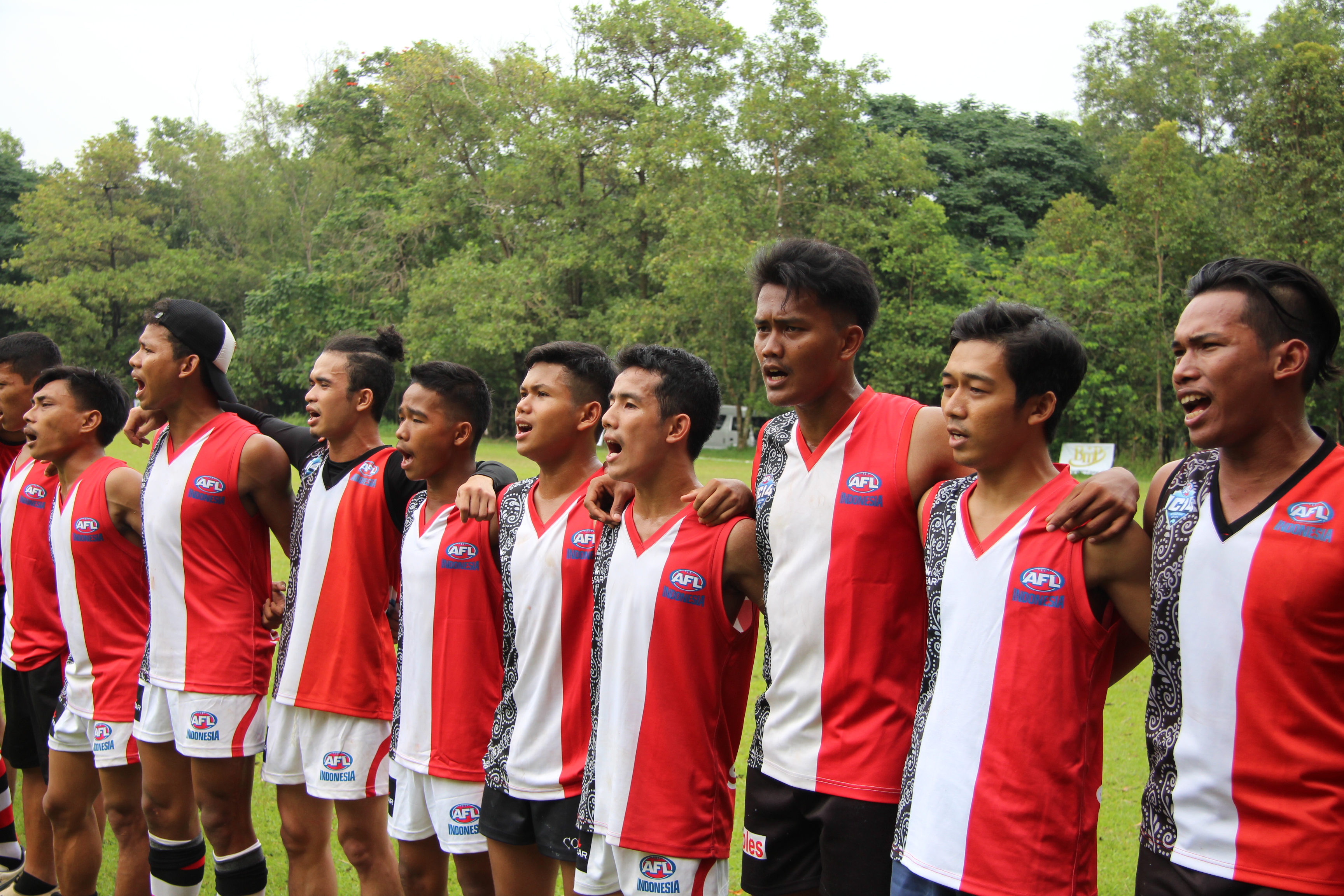




Reader Interactions